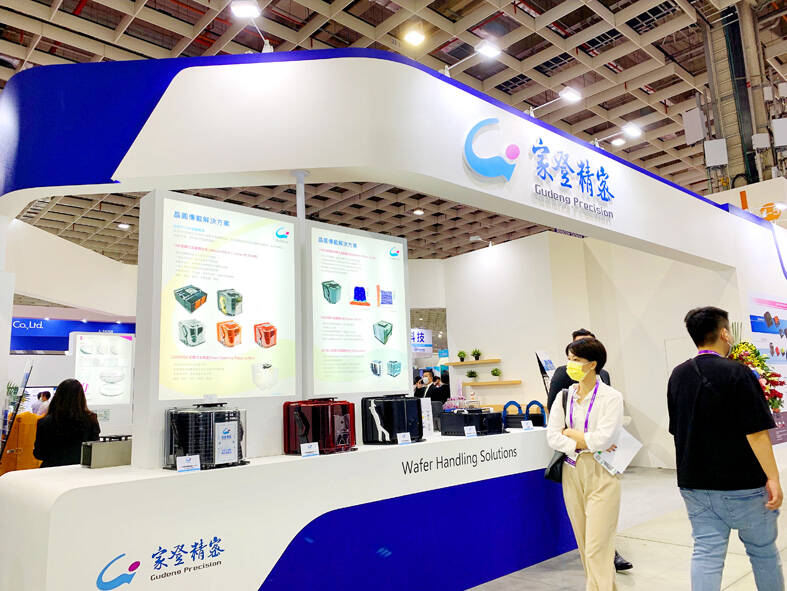Gudeng Precision Industrial Co (家登精密), which supplies wafer pods to the world's major semiconductor firms, yesterday announced plans to form a new venture to accelerate supply chain deployment in the US in the wake of new US trade and tariff policies.
Gudeng would be joined by several companies in the local semiconductor supply chain, as they seek to cope with dramatic changes in the geopolitical situation and US President Donald Trump’s trade policies, Gudeng said.
It comes as Taiwan Semiconductor Manufacturing Co (TSMC, 台積電) last week announced an additional US$100 billion investment in the US, which includes three chip manufacturing fabs, two advanced chip packaging plants and a research-and-development center.

Photo: Grace Hung, Taipei Times
Two years ago, Gudeng initiated the idea of forming an alliance with eight local semiconductor companies, creating a new company, TSS Holdings Ltd (德鑫半導體控股), focusing on its operations in the US.
Member companies distribute and supply products to customers in the US, as well as provide real-time services through a more cost-effective approach, Gudeng said.
The new venture, which would be similar to that of TSS, is to be established later this year.
About 10 companies are participating, including specialty plastic compounds producer Nytex Composites Co (耐特科技) and AblePrint Technology Co (印能科技), which specializes in key equipment used in advanced chip packaging technology, such as chip-on-wafer-on-substrate (CoWoS).
Members of both alliances are direct or indirect suppliers to TSMC, providing wafer pods, semiconductor materials, advanced chip packaging-related equipment and industrial intelligence applications.
Gudeng, a key supplier of extreme ultraviolet (EUV) and high-numerical aperture EUV pods to TSMC, is considering building its first production base in the US to address growing demand from key customers.
It also supplies advanced front-opening unified pods and wafer cassettes to TSMC and Intel Corp, as well as Chinese and South Korean chipmakers. Gudeng has a warehouse in Arizona.
The company said its new pods, used in the production procedure of CoWoS, are currently undergoing qualification by customers.
The new products are expected to fuel the company’s growth momentum, as one of its major customers is boosting CoWoS capacity in the second half of this year and another key customer is restarting its CoWoS projects following a two-year suspension, Gudeng said.

Six Taiwanese companies, including contract chipmaker Taiwan Semiconductor Manufacturing Co. (TSMC), made the 2025 Fortune Global 500 list of the world’s largest firms by revenue. In a report published by New York-based Fortune magazine on Tuesday, Hon Hai Precision Industry Co. (better known as Foxconn) ranked highest among Taiwanese firms, placing 28th with revenue of US$213.69 billion. Up 60 spots from last year, TSMC rose 60 places to reach No. 126 with US$90.16 billion in revenue, followed by Quanta Computer Inc. at 348th, Pegatron Corp. at 461st, CPC Corp., Taiwan at 494th and Wistron Corp. at 496th. According to Fortune, the world’s

NEW PRODUCTS: MediaTek plans to roll out new products this quarter, including a flagship mobile phone chip and a GB10 chip that it is codeveloping with Nvidia Corp MediaTek Inc (聯發科) yesterday projected that revenue this quarter would dip by 7 to 13 percent to between NT$130.1 billion and NT$140 billion (US$4.38 billion and US$4.71 billion), compared with NT$150.37 billion last quarter, which it attributed to subdued front-loading demand and unfavorable foreign exchange rates. The Hsinchu-based chip designer said that the forecast factored in the negative effects of an estimated 6 percent appreciation of the New Taiwan dollar against the greenback. “As some demand has been pulled into the first half of the year and resulted in a different quarterly pattern, we expect the third quarter revenue to decline sequentially,”

WEAKER ACTIVITY: The sharpest deterioration was seen in the electronics and optical components sector, with the production index falling 13.2 points to 44.5 Taiwan’s manufacturing sector last month contracted for a second consecutive month, with the purchasing managers’ index (PMI) slipping to 48, reflecting ongoing caution over trade uncertainties, the Chung-Hua Institution for Economic Research (CIER, 中華經濟研究院) said yesterday. The decline reflects growing caution among companies amid uncertainty surrounding US tariffs, semiconductor duties and automotive import levies, and it is also likely linked to fading front-loading activity, CIER president Lien Hsien-ming (連賢明) said. “Some clients have started shifting orders to Southeast Asian countries where tariff regimes are already clear,” Lien told a news conference. Firms across the supply chain are also lowering stock levels to mitigate

DIVERSIFYING: Taiwanese investors are reassessing their preference for US dollar assets and moving toward Europe amid a global shift away from the greenback Taiwanese investors are reassessing their long-held preference for US-dollar assets, shifting their bets to Europe in the latest move by global investors away from the greenback. Taiwanese funds holding European assets have seen an influx of investments recently, pushing their combined value to NT$13.7 billion (US$461 million) as of the end of last month, the highest since 2019, according to data compiled by Bloomberg. Over the first half of this year, Taiwanese investors have also poured NT$14.1 billion into Europe-focused funds based overseas, bringing total assets up to NT$134.8 billion, according to data from the Securities Investment Trust and Consulting Association (SITCA),